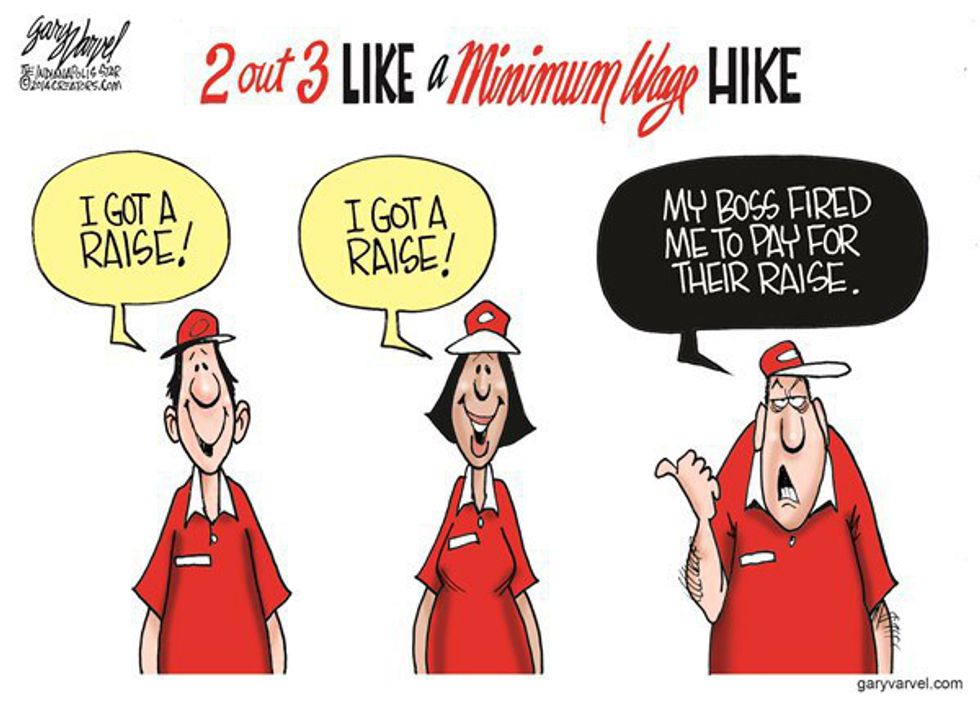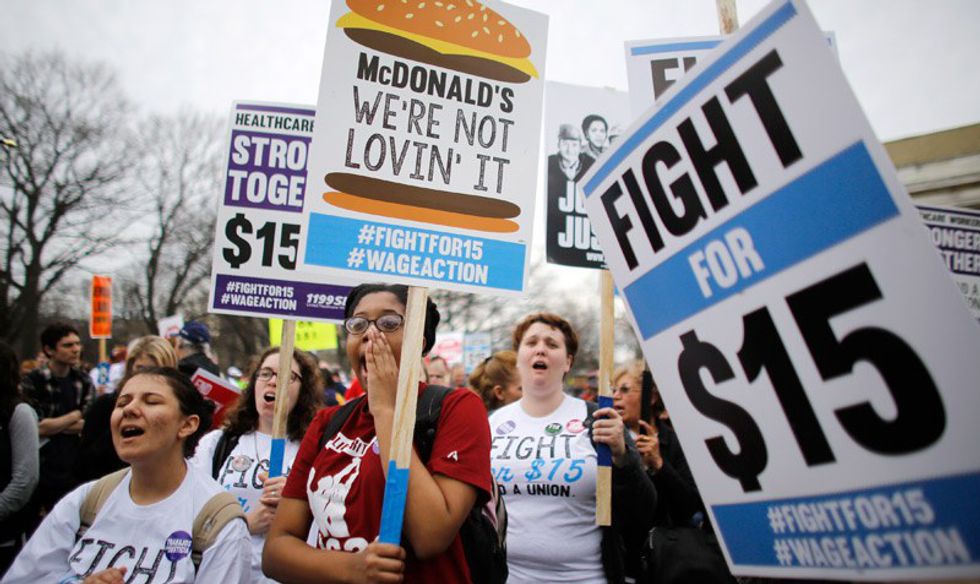Presidential candidates such as Bernie Sanders argue that the minimum wage should be increased to 15 dollars an hour. They argue that this would be a wage on which working families could live, and the increase in income would increase consumer spending and investment, which would increase aggregate demand, which would ultimately help the economy. But, something politicians (such as Bernie Sanders) often overlook, is that the laws of supply and demand cannot be repealed. They are a part of the human condition as a result of trade. The minimum wage is a price floor (government-imposed limit on how low prices can go). So, when a price floor is enforced, the supply is greater than the demand for the good, causing a surplus. The size of the surplus depends on how high the price control is above the equilibrium price. In other words, according to economic law, a minimum wage set above the equilibrium wage will cause the supply of labor to be greater than the demand for it, resulting in unemployment. As the minimum wage rises further from the equilibrium, the number of unemployed continues to increase.
.
In addition, those who would lose their jobs would be those who were the lowest skilled and most likely the more vulnerable workers. For example, three workers at a fast food restaurant are making minimum wage of $8.00 an hour. One worker’s production level is valued at $12 an hour, the other worker’s production level is valued at $10 an hour, and the last one, who is less experienced and skilled, has a production level of about $8.50 an hour. Now say the minimum wage rises to $9.50 an hour. The labor costs for the restaurant rise, and each workers’ value addition to the company shrinks. Worker 1 and worker 2 are still earning money for the restaurant so they keep their jobs. The last worker, however, only produces worth $8.50 an hour and now costs the company one dollar per hour due to the new $9.50 wage, so he loses his job. This person now loses out on building skills that could help him get better jobs in the future.
Do Studies Confirm Supposed Economic Law?
Most of the large swath of economic studies on the minimum wage from the 50s to the 80s confirmed that increases in the minimum wage do cause unemployment, with a few exceptions. In addition, those found to be hurt the most by increases in the minimum wage were those who needed these jobs the most, such as teens and minority groups. More recently, in the era of the “New Research on the Minimum Wage” that began in the 90s and continues today, results seem to be conflicting. Some studies point to decreases in employment due to increases in the minimum wage, but some studies also point to either no or a statistically insignificant amount of employment reduction from increases in the minimum wage. While economists are often divided on the effects of small increases in the minimum wage, many also admit that “they don’t know what would happen” or that negative impacts on employment could occur with a larger jump in minimum wage, such as the jump to a 15 dollar minimum wage advocated by Bernie Sanders.
Economic Research on Minimum Wage from 50s to 80s: (Most Confirm Reductions in Employment due to Minimum Wage)
- "Joint Economic Committee Republicans Collection of Minimum Wage Studies":Large collection of Minimum Wage Studies from 1950s to the 1980s: Most confirm that minimum wage increases caused unemployment and disproportionately hurt minority and low-skilled workers.
- Card & Krueger Study finding no effect on teenage employment, and an increase in wages.(Early 90s).
“New” Economic Research on Minimum Wage (1990s – Present) (Results are Conflicting)
“New” Studies Showing Unemployment Due To Increases in Minimum Wage
- “Response of Hours of Work to Increases in Minimum Wage” by Couch & Wittenburg (2001). Findings show a decrease in work hours in response to increases in the minimum wage.
- 2014 CBO Report concludes that some workers incomes rise due to increases in minimum wage, but many would lose employment as well. Those who lose employment due to the increased minimum wage often experience a decrease in income.
- NBER Working Paper: Review of Evidence from the New Minimum Wage Research (2006): A review from dozens of studies in the “new” minimum wage research in the U.S. and a few other countries that shows negative effects on employment, and that lower-skill workers were disproportionately affected.
Studies Showing Little to No Employment Effects Due To Increases In Minimum Wage
Institute for Research on Labor and Employment (IRLE) Study showing increase in worker income and no employment effects in response to minimum wage increases.- Economic Policy Institute (EPI) Report shows income boosts and no employment effects in response to increases in minimum wages.
- “Why Does Raising the Minimum Wage Have no Discernible Effect on Employment?”Center for Economic Policy and Research (CEPR) report reviewing a few recent studies from 2011 and 2012 that show raising the minimum wage had no discernible impact once regional employment trends were controlled.

























